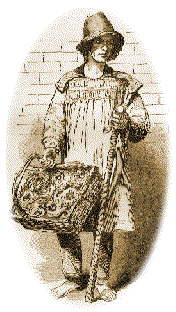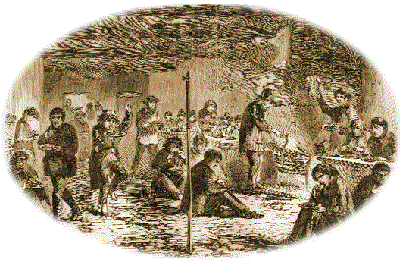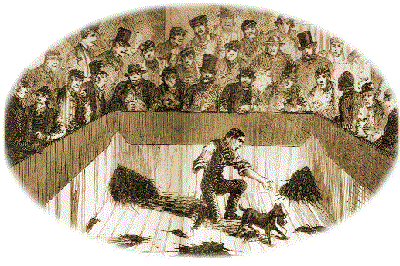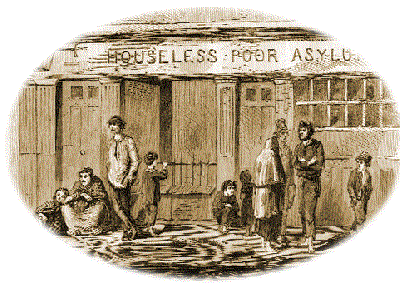
 |
||||
|
|
|
|
||
The London of Human Frailty – the weak, the wicked and the well-meaning
Report on the 1997 Local History Conference by Jim Golland
Illustrations derived from the first edition of Henry Mayhew’s London Labour and the London Poor (1851)
 It was an inspired subject for a conference – the Weak, the
Wicked and the Well-Meaning. Overall, the general pattern that
emerged was that people were often weak or wicked because of their
circumstances as much as because of their natures.
It was an inspired subject for a conference – the Weak, the
Wicked and the Well-Meaning. Overall, the general pattern that
emerged was that people were often weak or wicked because of their
circumstances as much as because of their natures.
Brian Bloice dipped into Mayhew's book on the London poor – written in 1851 – to show how people scraped together a living somehow – whether it was by sweeping up some of the 38lbs of manure deposited daily by each horse, or by selling birds' nests, complete with eggs. Mudlarking on the Thames foreshore or emptying the night soil kept people alive, if only on a pittance. There were 43,000 street sellers, hawking such things as chairs, fish or baked potatoes. Mayhew even delved – with police protection – into thieves' kitchens and other dens of vice, meeting fallen daughters of country vicars offering their services.
Other dens of vice were dealt with by Virginia Berridge. She showed that opium dens had had a bad press. A combination of class distinction, racial fears, romantic novelists and Dr Fu Man Chu led us to fear the worst. In fact, it was the press of people in a crowded room that induced sleep, rather than the narcotics. When the actress Billie Carlton was found dead in bed from an overdose of opium in 1919, public opinion soon imagined sexual orgies. The subsequent outcry led to increasingly strict legislation.
John Black read a thesis on illegitimacy, derived from over 2000
Bastardy Statements that he had studied from three London parishes.
In particular, he had examined the trades of those reputed to be the
fathers of illegitimate children.  There was a surprising absence of
gentry. Probably they had their own kept mistresses, or the servant
girls whom they ruined had been paid to keep quiet. Household
servants appeared as fathers on a seasonal tide. During the summer
months their employers would be out of town, and opportunities for
consorting with young maidens were removed. Most illegitimate
births in fact were to couples who had been expecting to get married
but who had been taken surprise by some financial problem.
There was a surprising absence of
gentry. Probably they had their own kept mistresses, or the servant
girls whom they ruined had been paid to keep quiet. Household
servants appeared as fathers on a seasonal tide. During the summer
months their employers would be out of town, and opportunities for
consorting with young maidens were removed. Most illegitimate
births in fact were to couples who had been expecting to get married
but who had been taken surprise by some financial problem.
Many couples cohabited for long periods, like the aptly named Mr Hemlock, a druggist, who had three children by his servant over a ten- year period. Labourers, soldiers and others whose work was insecure or even dangerous were unwilling to commit themselves to matrimony. Many, as today, were happier living together without the marriage lines.
Cathy Ross argued that the poverty of their surroundings could lead people easily to crime. Bethnal Green, where the Underground reached only in 1946, was a self-contained parish with its own customs and standards of behaviour, quite separate from the alien influences in nearby Whitechapel and Spitalfields. Differing moral standards could lead to petty crimes being tolerated. Significantly, some of the most infamous of modern criminals have sprung from just those streets.
 People who lived in sordid surroundings tended to live sordid lives,
enlivened by brutal sports and entertainments. Denis Edwards gave us
a lively picture of the cock fighting, bear-baiting and other such
horrors that proliferated in the 18th century, particularly at Hockley in
the Hole and Saffron Hill. We were cheered to learn that in 1709 the
proprietor of one bear pit was chewed by a bear! Many of these
activities later found their way into fairs, like May Fair.
People who lived in sordid surroundings tended to live sordid lives,
enlivened by brutal sports and entertainments. Denis Edwards gave us
a lively picture of the cock fighting, bear-baiting and other such
horrors that proliferated in the 18th century, particularly at Hockley in
the Hole and Saffron Hill. We were cheered to learn that in 1709 the
proprietor of one bear pit was chewed by a bear! Many of these
activities later found their way into fairs, like May Fair.
It was not long before the plight of the weak and wicked drew the
attention of well-meaning philanthropists. Father Scott Anderson
explained how, in an effort to redeem Bethnal Green, twelve new
churches were built there by Bishop Blomfield, one for each apostle.
For over a hundred years the Anglo-Catholics, in particular, were
keenly interested in helping to alleviate poverty – a contrast with
modern times, when more energy is expended in arguing about details
of the liturgy!  Universities and public schools ran missions in the East
End. Public Health Acts, laws against drugs, prostitution and child
labour, new housing with water closets, and main drainage all
combined to make life more tolerable for the poor. But not everyone
was satisfied. When Bethnal Green council planned to arrange brass
band concerts in Victoria Park on Sundays, it was vigorously opposed
by local churchmen.
Universities and public schools ran missions in the East
End. Public Health Acts, laws against drugs, prostitution and child
labour, new housing with water closets, and main drainage all
combined to make life more tolerable for the poor. But not everyone
was satisfied. When Bethnal Green council planned to arrange brass
band concerts in Victoria Park on Sundays, it was vigorously opposed
by local churchmen.
The most intriguing title on the programme was one that referred to ‘hairless perverts with twitching lips’. This turned out to be a description of the British Sexology Society, which was concerned with freedom of expression in matters of love, and in particular with obtaining a better deal for homosexuals. As Lesley Hall showed, although the Society faded out during the Second World War, most of its aims have now been generally accepted. Among its most vigorous members was Laurence Housman, whose plays often fell foul of the Censor.